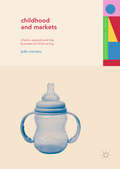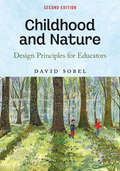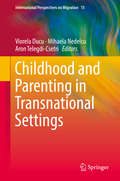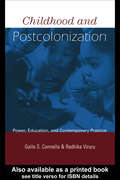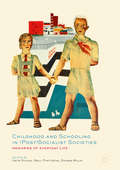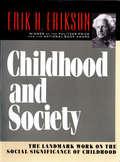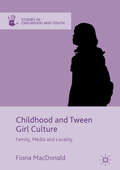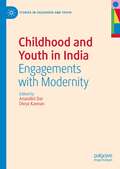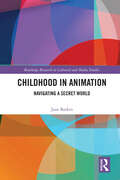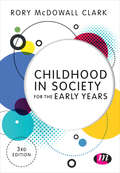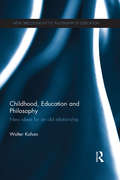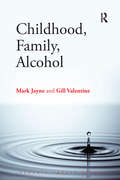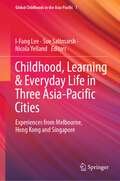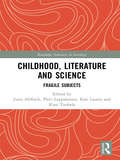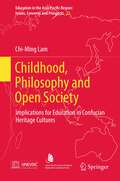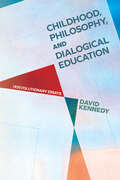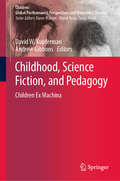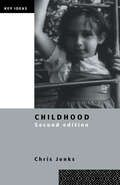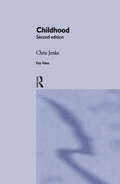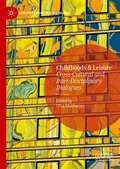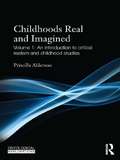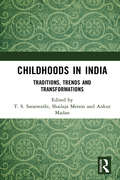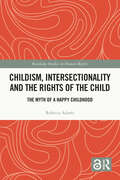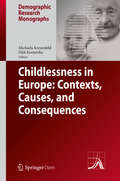- Table View
- List View
Childhood and Markets: Infants, Parents and the Business of Child Caring (Studies in Childhood and Youth)
by Lydia MartensThis book explores how young children and new families are located in the consumer world of affluent societies. The author assesses the way in which the value of infants and monetary value in markets are realized together, and examines how the meanings of childhood are enacted in the practices, narratives and materialities of contemporary markets. These meanings formulate what is important in the care of young children, creating moralities that impact not only on new parents, but also circumscribe the possibilities for monetary value creation. Three main understandings of early childhood - those of love, protection and purification - and their interrelationships are covered, and illustrated with examples including food, feeding tools, nappies, travel systems and toys. The book concludes by re-examining the relationship between adulthood and the cultural value of young children, and by discussing the implications of the ways markets address young children, also examines the realities of older children in consumer culture. Childhood and Markets will be of interest to students and scholars of sociology, childhood studies, anthropology, cultural studies, media studies, business studies and marketing.
Childhood and Nature: Design Principles for Educators
by David SobelChildhood and Nature is a guide for educators looking to foster in their students a love of nature as well as an understanding of complex environmental issues. This second edition brings new material and fresh insights to David Sobel's foundational exploration of place-based education.Sobel articulates seven design principles that teachers can use to build learning experiences: adventure, fantasy and imagination, animal allies, maps and paths, special places, small worlds, and hunting and gathering,. Pulling from recurrent play themes and real-world examples from educators, Sobel details placed-based projects and lessons for each principle. Students learn and develop vital skills through engagement with their local environments and communities. Miniature ecosystems in the "small world" of a sandbox, for example, can help children grasp larger, abstract ideas. A timely and actionable resource, Childhood and Nature shows how centering the world around us in education can create a generation of nature students, explorers, and protectors.
Childhood and Parenting in Transnational Settings (International Perspectives on Migration #15)
by Viorela Ducu Mihaela Nedelcu Aron Telegdi-CsetriThis book describes children and youth on the one hand and parents on the other within the newly configured worlds of transnational families. Focus is put on children born abroad, brought up abroad, studying abroad, in vulnerable situations, and/or subject of trafficking. The book also provides insight into the delicate relationships that arise with parents, such as migrant parents who are parenting from a distance, elderly parents supporting migrant adult children, fathers left behind by migration, and Eastern-European parents in Nordic countries. It also touches upon life strategies developed in response to migration situations, such as the transfer of care, transnational (virtual) communication, common visits (to and from), and the co-presence of family members in each other’s (distant) lives. As such this book provides a wealth of information for researchers, policy makers and all those working in the field of migration and with migrants.The chapter 'Afterword: Gender Practices in Transnational Families' is open access under a CC BY 4.0 license via link.springer.com.
Childhood and Postcolonization: Power, Education, and Contemporary Practice (Changing Images of Early Childhood)
by Gaile S. Cannella Radhika ViruruThis book opens the door to the effects of intellectual, educational, and economic colonization of young children throughout the world. Using a postcolonial lens on current educational practices, the authors hope to lift those practices out of reproducing traditional power structures and push our thinking beyond the adult/child dichotomy into new possibilities for the lives that are created with children.
Childhood and Schooling in (Post)Socialist Societies: Memories of Everyday Life
by Zsuzsa Millei Iveta Silova Nelli PiattoevaThis book explores childhood and schooling in late socialist societies by bringing into dialogue public narratives and personal memories that move beyond imaginaries of Cold War divisions between the East and West. Written by cultural insiders who were brought up and educated on the eastern side of the Iron Curtain - spanning from Central Europe to mainland Asia - the book offers insights into the diverse spaces of socialist childhoods interweaving with broader political, economic, and social life. These evocative memories explore the experiences of children in navigating state expectations to embody "model socialist citizens" and their mixed feelings of attachment, optimism, dullness, and alienation associated with participation in "building" socialist futures. Drawing on the research traditions of autobiography, autoethnography, and collective biography, the authors challenge what is often considered 'normal' and 'natural' in the historical accounts of socialist childhoods, and engage in (re)writing histories that open space for new knowledges and vast webs of interconnections to emerge. This book will be compelling reading for students and researchers working in education, sociology and history, particularly those within the interdisciplinary fields of childhood and area studies. 'The authors of this beautiful book are professional academics and intellectuals who grew up in different socialist countries. Exploring "socialist childhoods" in myriad ways, they draw on memories, and collective history, emotional insider knowledge and the measured perspective of an analyst. What emerges is life that was caught between real optimism and dullness, ethical commitments and ideological absurdities, selfless devotion to children and their treatment as a political resource. Such attention to detail and examination of the paradoxical nature of this time makes this collective effort not only timely but remarkably genuine. ' --Alexei Yurchak, University of California, USA
Childhood and Society
by Erik H. EriksonThe landmark work on the social significance of childhood. The original and vastly influential ideas of Erik H. Erikson underlie much of our understanding of human development. His insights into the interdependence of the individuals' growth and historical change, his now-famous concepts of identity, growth, and the life cycle, have changed the way we perceive ourselves and society. Widely read and cited, his works have won numerous awards including the Pulitzer Prize and the National Book Award. Combining the insights of clinical psychoanalysis with a new approach to cultural anthropology, Childhood and Society deals with the relationships between childhood training and cultural accomplishment, analyzing the infantile and the mature, the modern and the archaic elements in human motivation. It was hailed upon its first publication as "a rare and living combination of European and American thought in the human sciences" (Margaret Mead, The American Scholar). Translated into numerous foreign languages, it has gone on to become a classic in the study of the social significance of childhood.
Childhood and Tween Girl Culture: Family, Media and Locality (Studies in Childhood and Youth)
by Fiona MacDonaldThis book explores the ways in which notions of childhood are being influenced by a rapidly expanding consumer-media culture in the 21st Century. It has been argued that new stages of childhood are being created and defined by children’s role as consumers. The concept of ‘tween’, girls aged between 9 and 14, has generated the greatest debate. While the fantasy world of ‘tween’ offers girls a space to fashion a young, feminine identity it has been widely argued that the consumer-media’s messages pressure tween girls to consume and adopt highly sexualised appearances and behaviours. The author considers how the art of consumption for ‘tween’ girls is intrinsically linked with their desire for independence and belonging, and how their consumption is interwoven with other important social and cultural influences. The book will be of interest to scholars and students in the fields of Childhood and Youth Studies, Cultural Studies, Feminist and Women’s Studies and Sociology.
Childhood and Youth in India: Engagements with Modernity (Studies in Childhood and Youth)
by Anandini Dar Divya KannanThis edited volume advances the conceptual framework of the 'everyday urban' to unpack the ways in which processes of modernity in India shape young subjects and, in so doing, centers the analytical categories of childhood and youth. In rejecting simplistic binaries of agency, and teleological logics of development and modernity, the authors focus on the complex pathways of negotiation and conflict that mark the lives of young people across various historical and contemporary contexts in urban India. Chapters are organized across two key themes: Shaping Modern Subjects and Being Modern Subjects, while spanning multiple disciplines including anthropology, history, sociology, disability studies, and psychology. Together, the contributions aim to advance the field of childhood and youth studies in South Asia and beyond.
Childhood in Animation: Navigating a Secret World (Routledge Research in Cultural and Media Studies)
by Jane BatkinChildhood in Animation: Navigating a Secret World explores how children are viewed in animated cinema and television and examines the screen spaces that they occupy.The image of the child is often a site of conflict, one that has been captured, preserved, and recollected on screen; but what do these representations tell us about the animated child and how do they compare to their real counterparts? Is childhood simply a metaphor for innocence, or something far more complex that encompasses agency, performance, and othering? Childhood in Animation focuses on key screen characters, such as DJ, Norman, Lilo, the Lost Boys, Marji, Parvana, Bluey, Kirikou, Robyn, Mebh, Cartman and Bart, amongst others, to see how they are represented within worlds of fantasy, separation, horror, politics, and satire, as well as viewing childhood itself through a philosophical, sociological, and global lens. Ultimately, this book navigates the rabbit hole of the ‘elsewhere’ to reveal the secret space of childhood, where anything (and everything) is possible.This volume will be of great interest to scholars and students of animation, childhood studies, film and television studies, and psychology and sociology.
Childhood in Society
by Rory Mcdowall ClarkChildhood can only be understood in relation to the multitude of social factors which surround it. This accessible text explores children’s place within society through an examination of the different contexts within which a child exists. It begins by looking at the child within the family then goes on to examine the child within the educational setting, the community, the nation and the global perspective. The child's own perspective is explored, recognising children as social agents in their own right. Finally it examines the current climate, making links with Every Child Matters, and considers today's public perceptions of childhood.
Childhood in Society for the Early Years
by Rory ClarkChildhood can only be understood in relation to the multitude of social factors which surround it. Written for students of degrees and foundation degrees in Early Years, Early Childhood Studies and related disciplines, this accessible text offers an introduction to the study of these complex issues including the different contexts within which childhood exists. These contexts, from the child within the family, to the global perspective and the child's own perspective are closely examined. This second edition is updated in line with recent changes to early years policy and includes a new chapter 'The context of partnership: children in transition'. About the Early Years Series This series has been designed to support students of Early Years, Early Childhood Studies and related disciplines in popular modules of their course. Each text takes a focused look at a specific topic and approaches it in an accessible and user-friendly way. Features have been developed to help readers engage with the text and understand the subject from a number of different viewpoints. Activities pose questions to prompt thought and discussion and 'Theory Focus' boxes examine essential theory close-up for better understanding. This series is also applicable to EYPS candidates on all pathways. Other titles in the series are Early Childhood Studies, Becoming a Practitioner in the Early Years, Child Observation for the Early Years and Exploring Play for Early Childhood Studies. Rory McDowall Clark originally trained as a nursery and primary teacher in Brighton and has a wide range of experience in broader social contexts including community development with charities, voluntary organisations and outreach youth work. Rory is a senior lecturer in the Centre for Early Childhood at the University of Worcester.
Childhood, Education and Philosophy: New ideas for an old relationship (New Directions in the Philosophy of Education)
by Walter KohanThis book explores the idea of a childlike education and offers critical tools to question traditional forms of education, and alternative ways to understand and practice the relationship between education and childhood. Engaging with the work of Michel Foucault, Jacques Rancière, Giorgio Agamben and Simón Rodríguez, it contributes to the development of a philosophical framework for the pedagogical idea at the core of the book, that of a childlike education. Divided into two parts, the book introduces innovative ideas through philosophical argument and discussion, challenging existing understandings of what it means to teach or to form a child, and putting into question the idea of education as a process of formation. The first part of the book consists of a dialogue with a number of interlocutors in order to develop an original conception of education. The second part presents the idea of a childlike education, beginning with a discussion of the relationships between childhood and philosophy, and followed by a critique of the place of philosophical experience in a childhood of education. Instead of asking how philosophy might educate childhood, this book raises the question of how childhood might educate philosophy. It will be of key value to researchers, educators and postgraduate students in the fields of education and the human sciences.
Childhood, Family, Alcohol: Family Life And Alcohol
by Gill Valentine Mark JayneDrawing together international research from the fields of geography, alcohol studies, sociology, psychology and childhood studies, Jayne and Valentine explore children’s understandings and experiences of alcohol consumption and the role of alcohol in family life. Chapters address both extra-familial ’norms’ about parenting and drinking cultures which are generated in wider society (through law/regulation, media/advertising and social networks etc.) and intra-familial ’norms’, including the modelling behaviour of family members’, attitudes to alcohol, drinking habits and practices, rules and guidance, and initiating children to drinking. Based on empirical research undertaken in the UK, and drawing on studies from around the world, Childhood, Family, Alcohol advances theoretical debates and offers insights relevant to policy and practice by: · adopting a cross-generational perspective on drinking cultures · exploring pre-teen children’s understandings of alcohol · focusing on the significance of the spaces of everyday family life · considering adult alcohol consumption, drinking practices and drunken performativities · reflecting on social/individualized consumption, social reproduction, adult-children interaction and materialities · showing the importance of non-(and more-than) representational understanding of the complexities of childhood, family life and alcohol consumption.
Childhood, Learning & Everyday Life in Three Asia-Pacific Cities: Experiences from Melbourne, Hong Kong and Singapore (Global Childhoods in the Asia-Pacific #1)
by Nicola Yelland Sue Saltmarsh I-Fang LeeThis book introduces findings from an international, cross-cultural, and interdisciplinary study of children’s everyday experiences of growing up and going to school in the context of the three global cities of Hong Kong, Singapore and Melbourne. It takes the premise that children’s learning and orientations to educational success are shaped by everyday cultural practices at home and at school, by policy contexts that both produce and respond to educational and cultural norms, and by individual and familial desires and aspirations. Drawing on research conducted with primary school-aged children in Year 4, the book considers how day-to-day routines such as going to school, engaging in extra-curricular activities outside of school, and spending time at home with family intersect with the broader milieus of education policy ideals in a changing and interconnected world. Through a combination of visual methodologies, surveys, ethnographic observations in schools, classrooms and cityscapes, re-enactments of everyday activities with children at home, and sociological education policy analysis, this book shows both the richness of children’s everyday lives and learning in global cities, as well as exploring questions that pose challenges to educational and social norms.
Childhood, Literature and Science: Fragile Subjects (Routledge Advances in Sociology)
by Päivi Lappalainen Jutta Ahlbeck Kati Launis Kirsi TuohelaHow do we understand, imagine and remember childhood? In what ways do cultural representations and scientific discourses meet in their ways of portraying children? Childhood, Literature and Science aims to answer these questions by tracing how images of childhood(s) and children in Western modernity are entangled with notions of innocence and fragility, but also with sin and evilness. Indeed, this interdisciplinary collection investigates how different child figures emerge or disappear in imaginative and social representations, in the memories of adult selves, and in expert knowledge. Questions about childhood in Western modernity, culture and science are also addressed through insightful analysis of a variety of materials from the Enlightenment age to the present day – such as fiction, life narratives, visual images, scientific texts and public writings. Analysing childhood as a discursive construction, Childhood, Literature and Science will appeal to scholars as well as undergraduate and postgraduate students interested in fields such as: Childhood Studies, History, Gender Studies, Cultural Studies, Literature and Sociology of the Family.
Childhood, Philosophy and Open Society: Implications for Education in Confucian Heritage Cultures (Education in the Asia-Pacific Region: Issues, Concerns and Prospects #22)
by Chi-Ming LamThe purpose of this book is to develop a theory and practice of education from Karl Popper's non-justificationist philosophy for promoting an open society. Specifically, the book is designed to develop an educational programme for fostering critical thinking in children, particularly when they are involved in group discussion.The study conducted an experiment to assess the effectiveness of Matthew Lipman's Philosophy for Children (P4C) programme in promoting Hong Long (Chinese) children's critical thinking. Forty-two Secondary 1 students volunteered for the experiment, from whom 28 students were randomly selected and randomly assigned to two groups of 14 each: one receiving P4C lessons and the other receiving English lessons. The students who were taught P4C were found to perform better in the reasoning test than those who were not, to be capable of discussing philosophical problems in a competent way, and to have a very positive attitude towards doing philosophy in the classroom. It was also found that P4C played a major role in developing the students' critical thinking.Considering that the construction of children by adults as incompetent in the sense of lacking reason, maturity, or independence reinforces the traditional structure of adult authority over children in society, it runs counter to the goal of fostering critical thinking in children. As a way to return justice to childhood and to effectively promote critical thinking in children, the present study suggested reconstructing the concept of childhood, highlighting the importance of establishing a coherent public policy on promotion of agency in children and also the importance of empowering them to participate actively in research, legal, and educational institutions.
Childhood, Philosophy, and Dialogical Education: (R)evolutionary Essays (SUNY series, Horizons in the Philosophy of Education)
by David KennedyChildhood, Philosophy, and Dialogical Educationn explores the history and prospects of democratic, dialogical education, and its promise as an engine of social and cultural evolution, especially in the context of the cultural and social site dedicated to the adult-child encounter: the school. Drawing on three historical narratives—of childhood, of subjectivity (psychohistory), and of education—the author offers the possibility of a form of schooling that fosters democratic sensibilities and teaches direct democracy through actual practice.
Childhood, Science Fiction, and Pedagogy: Children Ex Machina (Children: Global Posthumanist Perspectives and Materialist Theories)
by David W. Kupferman Andrew GibbonsThis book invites readers to both reassess and reconceptualize definitions of childhood and pedagogy by imagining the possibilities - past, present, and future - provided by the aesthetic turn to science fiction. It explores constructions of children, childhood, and pedagogy through the multiple lenses of science fiction as a method of inquiry, and discusses what counts as science fiction and why science fiction counts. The book examines the notion of relationships in a variety of genres and stories; probes affect in the convergence of childhood and science fiction; and focuses on questions of pedagogy and the ways that science fiction can reflect the status quo of schooling theory, practice, and policy as well as offer alternative educative possibilities. Additionally, the volume explores connections between children and childhood studies, pedagogy and posthumanism. The various contributors use science fiction as the frame of reference through which conceptual links between inquiry and narrative, grounded in theories of media studies, can be developed.
Childhood: Second edition (Key Ideas #10)
by Chris JenksIn this book Chris Jenks looks at what the ways in which we construct our image of childhood can tell us about ourselves. After a general discussion of the social construction of childhood, the book is structured around three examples of the way the image of the child is played out in society:the history of childhood from medieval times through the enlightenment 'discovery' of childhood to the presentthe mythology and reality of child abuse and society's response to itthe 'death' of childhood in cases such as the James Bulger murder in which the child itself becomes the perpetrator of evil.Part of the highly successful Key Ideas series, this book gives students a concise, provocative insight into some of the controlling concepts of our culture.
Childhood: Second edition (Key Ideas #10)
by Chris JenksIn this book Chris Jenks looks at what the ways in which we construct our image of childhood can tell us about ourselves. After a general discussion of the social construction of childhood, the book is structured around three examples of the way the image of the child is played out in society: the history of childhood from medieval times through the enlightenment 'discovery' of childhood to the present the mythology and reality of child abuse and society's response to it the 'death' of childhood in cases such as the James Bulger murder in which the child itself becomes the perpetrator of evil. Part of the highly successful Key Ideas series, this book gives students a concise, provocative insight into some of the controlling concepts of our culture.
Childhoods & Leisure: Cross-Cultural and Inter-Disciplinary Dialogues (Leisure Studies in a Global Era)
by Utsa MukherjeeThis edited volume brings together interdisciplinary scholarship on children’s everyday leisure from across the globe, addressing key questions around children’s agency, rights, child-adult relations, and social change. It is positioned to inaugurate a new frontier of research within leisure studies. Leisure theory has historically been adult-centric and based in the global north, and consequently, children’s lived experiences of leisure have remained marginal to theory-building exercises within leisure studies since its inception. As the call for decolonizing leisure studies grows, this book champions a cross-cultural and social justice agenda that does not privilege global north childhoods but acknowledges the multiplicity of lived childhoods across the globe and their inter-connections. By drawing attention to children’s leisure – across multiple genres such as organized leisure, sports, play, and digital leisure among others, this edited volume drives a new wave of research that speaks simultaneously to leisure studies and childhood studies and thereby advances the intellectual remit of global leisure studies.
Childhoods Real and Imagined: Volume 1: An introduction to critical realism and childhood studies
by Priscilla Alderson"This book is unusually rewarding in that its author has pulled off the rare trick of providing deep philosophical and theoretical underpinnings to a comprehensive reconsideration of childhood. Priscilla Alderson deploys Bhaskar's 'dialectical critical realism' to excellent effect, illuminating not only our understanding of the presence, and absence, of children in our lives and discourses, but also the field of childhood studies. It is rare that such an integrated text is accomplished and I look forward to the planned second volume. This is a work that should facilitate a rethinking of childhood for the new century." Graham Scrambler, Professor of Medical Sociology at University College London. Childhoods Real and Imagined explores and charts the relation of dialectical critical realist concepts to many aspects of childhood. By demonstrating their relevance and value to each other, Alderson presents an introductory guide to applied critical realism for researchers, lecturers and students. Each chapter summarises key themes from several academic disciplines and policy areas, combining adults’ and children’s reported views and experiences and filtering these through a critical realist analysis. The four main chapters deal with the more personal aspects of childhood in relation to the body, interpersonal relations, social structures, and the person, soul or self. The second volume will widen the scope to include the impact on children and young people of present policies relating to ecology, economics, ideas of social evolution or progress, and ethics. Each chapter demonstrates how children are an integral part of the whole of society and are often especially affected by policies and events. Through developing the dialectical critical realist analysis of childhood and youth Childhoods Real and Imagined will be of great interest to critical realists and childhood researchers and policy advisers.
Childhoods in India: Traditions, Trends and Transformations
by T. S. Saraswathi Shailaja Menon Ankur MadanThis book highlights the significance of an interdisciplinary approach to understanding children and childhoods in the Indian context. While it is recognised that multiple kinds of childhoods exist in India, policy and practice approaches to working with children are still based on a singular model of the ideal child rooted in certain Western traditions. The book challenges readers to go beyond the acknowledgement of differences to evolving alternate models to this conception of children and childhoods. Bringing together well-known scholars from history, politics, sociology, child development, paediatrics and education, the volume represents four major themes: the history and politics of childhoods; deconstructing childhoods by analysing their representations in art, mythology and culture in India; selected facets of childhoods as constructed through education and schooling; and understanding issues related to law, policy and practice, as they pertain to children and childhoods. This important book will be useful to scholars and researchers of education, especially those working in the domains of child development, sociology of education, educational psychology, public policy and South Asian studies.
Childism, Intersectionality and the Rights of the Child: The Myth of a Happy Childhood (Routledge Studies in Human Rights)
by Rebecca AdamiThis book is the first to comprehensively develop the concept of childism to understand, study, and analyze age-based discrimination against children.It presents a critical theory to help comprehend intersecting prejudice against children and to examine the weak implementation of the UN Convention on the Rights of the Child (CRC) and in what ways violations against children can be analyzed through the intersections of racist, sexist, and ableist discrimination. The book further offers scholars a new perspective when studying structural forms of discrimination and oppression against children and provides professionals with a new vocabulary on prejudice targeting children when assessing theory, policy, and praxis on ‘child-friendly’ and ‘child-centered’ initiatives that overlook the need to protect children against discrimination.This book will be of key interest to scholars, students, and practitioners of human rights, child and youth studies, education, prejudice studies, the United Nations and child law, and more broadly to sociology, social policy, psychology, and social work.Chapter 1 and Chapter 2 of this book are freely available as a downloadable Open Access PDF at http://www.taylorfrancis.com under a Creative Commons Attribution-Non Commercial-No Derivatives (CC-BY-NC-ND) 4.0 license.
Childlessness in Europe: Contexts, Causes, and Consequences (Demographic Research Monographs)
by Dirk Konietzka Michaela KreyenfeldThis book is published open access under a CC BY 4. 0 license. This open access book provides an overview of childlessness throughout Europe. It offers a collection of papers written by leading demographers and sociologists that examine contexts, causes, and consequences of childlessness in countries throughout the region. The book features data from all over Europe. It specifically highlights patterns of childlessness in Germany, France, the United Kingdom, Finland, Sweden, Austria and Switzerland. An additional chapter on childlessness in the United States puts the European experience in perspective. The book offers readers such insights as the determinants of lifelong childlessness, whether governments can and should counteract increasing childlessness, how the phenomenon differs across social strata and the role economic uncertainties play. In addition, the book also examines life course dynamics and biographical patterns, assisted reproduction as well as the consequences of childlessness. Childlessness has been increasing rapidly in most European countries in recent decades. This book offers readers expert analysis into this issue from leading experts in the field of family behavior. From causes to consequences, it explores the many facets of childlessness throughout Europe to present a comprehensive portrait of this important demographic and sociological trend.
